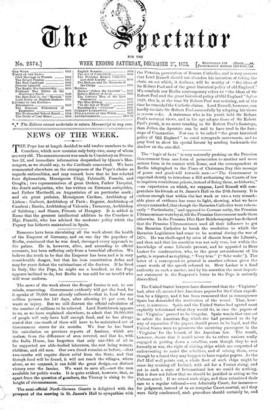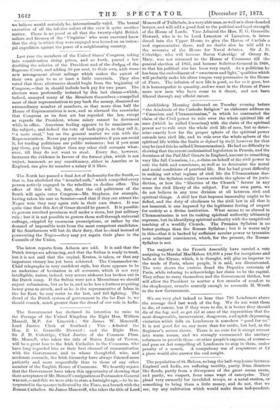The United States' lawyers have discovered that the Virginias' had,
after all, secured her American papers for the Cuban expedi- tion by a fdrgery, and it has been rumoured that in consequence Spain has demanded the restitution of the vessel. That, how- ever, is nonsense. Spain and the United States had agreed most explicitly beforehand what they would do, in case the papers of the Virginius ' proved to be irregular. Spain was in that case not to salute the American flag, which she had promised to do by way of reparation if the papers should prove to be legal, and the United States were to prosecute the surviving passengers in the Virginius' for the breach of the American law. The result,. however, shows that it would never do to refuse nations really engaged in putting down a rebellion, even though they be not formally at war, the right of visiting ships which are suspected of endeavouring to assist the rebellion, and of seizing them, even though by a fraud they may happen to have regular papers. As the Pall Mall well points out, a whole fleet of such ships might be some day cruising off Ireland, with aid for a Fenian rising, and yet in such a state of International law we could do nothing. But it does not follow that we should be justified in acting as the Cubans acted. If we seized such ships, and then submitted their case to a regular tribunal—our Admiralty Court, for instance— for judgment, instead of to an irregular Court-martial, aid they were fairly condemned, such procedure should certainly be, and
we believe would certainly be, internationally valid. The brutal execution of all the inferior sailors of the crew is quite another matter. There is no proof at all that the twenty-eight British sailors and firemen of the Virginius ' who were executed knew that the ship in which they were engaged was bound on an unlaw- ful expedition against the peace of a neighbouring country.



































